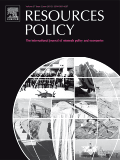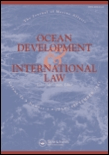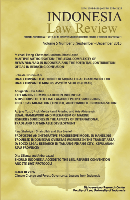
NATURAL RESOURCES JOURNAL
Scope & Guideline
Advancing sustainable solutions for our planet's resources.
Introduction
Aims and Scopes
- Environmental Law and Policy:
The journal emphasizes the analysis of legal frameworks governing environmental protection, conservation practices, and sustainable resource management. - Social Justice and Environmental Equity:
It addresses the critical intersection of environmental issues with social justice, focusing on the rights of marginalized communities and the equitable distribution of natural resources. - Water Rights and Governance:
The journal frequently explores the complexities of water rights, particularly in the context of Indigenous rights and the management of shared water resources. - Climate Change and Legal Responses:
A significant focus is placed on the legal implications of climate change, including litigation, regulatory frameworks, and innovative policy responses to mitigate its effects. - Technological Innovations in Resource Management:
The journal also investigates how emerging technologies, such as blockchain, can enhance transparency and efficiency in managing natural resources. - Wildlife Conservation and Animal Rights:
It includes discussions on the legal status of wildlife and the evolving concept of animal rights in the context of natural resource management.
Trending and Emerging
- Microplastics and Pollution:
Recent publications increasingly focus on the pervasive issue of microplastics, exploring their environmental and health impacts, signaling a growing awareness of plastic pollution. - Indigenous Rights and Resource Governance:
There is a notable trend towards examining Indigenous perspectives in resource governance, particularly regarding water rights and land use, reflecting a broader recognition of Indigenous sovereignty. - Climate Litigation:
The rise of climate litigation as a theme indicates a growing interest in legal mechanisms to hold corporations and governments accountable for environmental harm. - Innovative Environmental Regulations:
Emerging discussions around innovative regulatory frameworks, such as those incorporating blockchain technology in environmental governance, reflect a shift towards integrating technology in policy-making. - Urban Water Conservation Strategies:
Recent articles emphasize the importance of urban water conservation, particularly in the context of climate change, showcasing a proactive approach to resource management in urban settings.
Declining or Waning
- Traditional Resource Extraction:
There appears to be a decreased focus on conventional topics related to fossil fuel extraction and mining, possibly due to a broader societal shift towards renewable energy and sustainability. - Historical Perspectives on Environmental Law:
While historical analyses have been a feature of past publications, recent issues reflect a trend away from historical narratives, favoring contemporary legal challenges and innovative solutions. - General Environmental Awareness:
Papers that merely raise awareness about environmental issues without proposing specific legal or policy responses are becoming less frequent, indicating a move towards more actionable scholarship.
Similar Journals

Dixi
Fostering Interdisciplinary Dialogue for a Global AudienceDixi is an esteemed academic journal published by UNIV COOPERATIVA COLOMBIA, focusing on a wide range of disciplines within the humanities and social sciences. Since its transition to Open Access in 2012, Dixi has committed to democratizing knowledge by providing a platform for researchers and scholars to disseminate their findings without barriers. The journal is dedicated to fostering interdisciplinary dialogue and is particularly well-regarded for its contributions to cultural studies, sociology, and educational research. Located in Bucaramanga, Santander, Colombia, Dixi aims to engage a global audience of researchers, professionals, and students eager to advance their understanding of complex social issues. With its accessible format and commitment to rigorous peer review, Dixi is a vital resource for those seeking to enrich their academic work and influence contemporary discussions in their respective fields.

Revista Catalana de Dret Public
Illuminating the Future of Public LawRevista Catalana de Dret Public, published by the esteemed Escola Administració Pública Catalunya, stands as a pivotal resource in the fields of Law and Public Administration. With its roots dating back to 1985, this open-access journal has established itself as a significant platform for scholarly dialogue and research dissemination, benefiting a diverse audience in Spain and beyond. The journal is currently categorized in the Q2 quartile for Law and Q3 for Public Administration, with Scopus rankings reflecting its critical role in the academic landscape—positioning it at the 37th and 20th percentiles respectively. Furthermore, the Revista Catalana de Dret Public operates under an open-access model, ensuring that vital research is freely available to all, thereby enhancing knowledge sharing and collaboration within these fields. Through rigorous academic scrutiny and a commitment to public discourse, this journal aims to illuminate contemporary issues and foster advancements in public law and administration, making it an essential read for researchers, professionals, and students alike.

Resources Policy
Exploring Innovative Pathways in Resource ManagementResources Policy, published by ELSEVIER SCI LTD, is a prestigious journal that has been at the forefront of advancing knowledge in the fields of Economics, Law, and Sociology since its inception in 1974. With an impressive Q1 ranking in multiple disciplines—including Economics and Econometrics, Law, Management, Monitoring, Policy and Law, and Sociology and Political Science—this journal showcases high-impact research and insights that are vital for academics, policymakers, and practitioners alike. With Scopus rankings placing it in the top percentiles of its respective categories, Resources Policy fosters interdisciplinary dialogue, promoting innovative solutions and policies concerning the sustainable management and use of resources. While currently not an open-access publication, the journal ensures that its rich content is accessible to those pursuing rigorous research and professional excellence. As we approach its 50th anniversary in 2024, Resources Policy continues to be an essential platform for critical discussions, evaluation, and advancements in resource management.

OCEAN DEVELOPMENT AND INTERNATIONAL LAW
Navigating the Future of Ocean GovernanceOCEAN DEVELOPMENT AND INTERNATIONAL LAW, published by Taylor & Francis Inc, is an esteemed journal dedicated to the interdisciplinary study of ocean governance, environmental law, and international relations concerning marine resources. With an ISSN of 0090-8320 and an E-ISSN of 1521-0642, this journal serves as a vital platform for researchers, legal scholars, and policymakers interested in the evolving challenges of ocean development in a globalized context. The journal has established itself as a resourceful publication, evidenced by its ranking in the 2023 Scopus categories, where it is positioned in the 75th percentile for Law and the 66th percentile for Political Science and International Relations. Operating for over four decades, from 1973 until 2024, it is pivotal for advancing knowledge and fostering dialogue on critical issues such as environmental sustainability, international maritime policies, and legal frameworks governing the seas. Despite being a subscription-based journal, OCEAN DEVELOPMENT AND INTERNATIONAL LAW remains influential, offering significant insights that contribute to the development of effective legal instruments and governance strategies for oceanic resources.

Indonesia Law Review
Empowering Legal Minds Through Open Access ResearchIndonesia Law Review is a premier open-access academic journal dedicated to advancing knowledge in the fields of law and social sciences, with particular emphasis on the Indonesian legal landscape. Established by the Indonesian Law Review, this journal has made significant strides since becoming open access in 2014, ensuring that research is freely available to a global audience. Based in Depok, West Java, the journal seeks to foster scholarly discourse on legal issues pertinent to Indonesia, while also contributing to the broader field of education and social sciences. With its current Scopus rankings placing it within the top tiers of law and social sciences, including a Q3 categorization in law and a Q4 classification in education and miscellaneous social sciences, the **Indonesia Law Review** serves as a vital platform for researchers, professionals, and students to disseminate their findings and engage with contemporary legal dilemmas. The journal is committed to providing a robust forum for innovative legal scholarship and is an essential resource for anyone seeking to understand the complexities of law in Indonesia and beyond.

Resources-Basel
Advancing sustainable practices in environmental science.Resources-Basel is a premier open access journal published by MDPI, specializing in the fields of environmental science, management, and landscape conservation. Since its inception in 2012, the journal has established itself as a reputable source of scholarly research and discourse, achieving notable rankings including Q2 in Management, Monitoring, Policy and Law and Q1 in Nature and Landscape Conservation as of 2023. With impressive Scopus rankings, including a 27th place in the category of Environmental Science focused on Nature and Landscape Conservation, and a 82nd in Management, Monitoring, Policy and Law, Resources-Basel plays a crucial role in advancing knowledge and best practices within these vital domains. Based in Basel, Switzerland, the journal embraces the open access model, ensuring that research is widely accessible to scholars, practitioners, and the public alike, catering to the pressing issues of sustainable resource management and environmental conservation. Researchers, professionals, and students are encouraged to engage with the latest findings published here, contributing to the global discourse on sustainable practices and policy innovation.

Geography and Natural Resources
Illuminating the Path to Environmental StewardshipGeography and Natural Resources is a vital academic journal published by MAIK NAUKA/INTERPERIODICA/SPRINGER, focusing on diverse aspects of geography, natural resource management, and environmental sciences. With its ISSN 1875-3728 and E-ISSN 1875-371X, the journal serves as a platform for scholars and researchers to disseminate their findings in a rapidly evolving field. The journal holds a respectable Q3 ranking in the categories of Earth-Surface Processes and Geography, Planning and Development, as well as a Q4 ranking in Management, Monitoring, Policy, and Law, reflecting its commitment to quality research. Although it is not an open-access journal, it offers valuable insights and impactful articles tailored for professionals and academics interested in the intersection of human and environmental systems. By bridging theoretical and practical applications, Geography and Natural Resources plays a crucial role in guiding policies and enhancing understanding of sustainable development from 2008 to 2024 and beyond, making it an indispensable resource for the global scholarly community.

ECOLOGY LAW QUARTERLY
Exploring the nexus of law and environmental stewardship.ECOLOGY LAW QUARTERLY is a distinguished journal published by the University of California, Berkeley School of Law, focusing on the intersection of environmental law and ecological science. With a commitment to exploring critical legal and policy issues surrounding environmental protection and sustainability, this journal aims to provide a platform for innovative research and discourse. Though it holds an impact factor reflective of its Q4 in Environmental Science and Q3 in Law category quartiles, it remains a significant resource for legal scholars and practitioners alike, offering insight into contemporary legal challenges in environmental contexts. The quarterly has adapted to evolving academic standards since its inception in 1973, continuing to publish vital research that shapes policy and legal frameworks. Interested academics and practitioners can access the journal's content through the university's archives, ensuring a repository of knowledge crucial for advancing the fields of law and environmental science.

Environmental and Planning Law Journal
Exploring the Intersection of Policy and NatureEnvironmental and Planning Law Journal is a significant publication in the fields of law and environmental studies, published by LAWBOOK CO LTD in Australia. This journal, with the ISSN 0813-300X, has established itself as a crucial resource since its inception in 1984, providing a platform for scholarly discourse around legal frameworks affecting environmental planning and policy. Despite its coverage discontinuation in databases like Scopus, its impact remains recognized, achieving a rank of #455 in the Social Sciences Law category, indicating its relevance in legal scholarship. The journal is classified in the lower quartiles, yet it continues to address vital issues in geography, planning, and management of environmental law, engaging with contemporary challenges faced by policy-makers and practitioners. With no open access options currently available, the journal invites subscriptions and institutional access for its valuable content, making it a notable cornerstone for researchers, students, and professionals dedicated to navigating the complexities of environmental law and planning.

Chinese Journal of Environmental Law
Connecting Legal Frameworks with Environmental StewardshipChinese Journal of Environmental Law, published by BRILL, is a leading interdisciplinary journal that focuses on the intersection of environmental issues and legal frameworks within the context of China and beyond. With an ISSN of 2468-6034 and an E-ISSN of 2468-6042, it has been a vital contribution to the field since its inception in 2017. The journal aims to provide a platform for researchers, policy-makers, and practitioners to discuss and analyze the evolving landscape of environmental law, particularly in the context of management and policy implications. Notable for its academic rigor, it holds a Q2 ranking in Law and a Q3 ranking in Management, Monitoring, Policy and Law. In 2023, the journal was ranked at #516 out of 1025 in Social Sciences - Law and #328 out of 399 in Environmental Science. Although not open access, it is accessible through various academic institutions, making it a critical resource for anyone interested in shaping sustainable legal practices. The Chinese Journal of Environmental Law is set to continue its convergence of knowledge through 2024, reflecting its commitment to publishing cutting-edge research that influences both policy and practice.